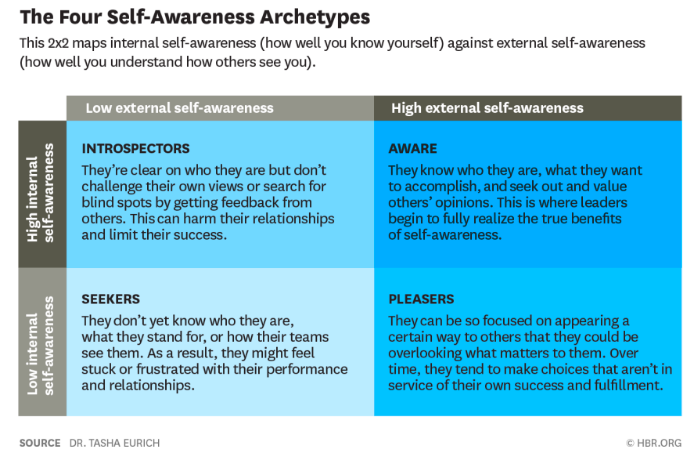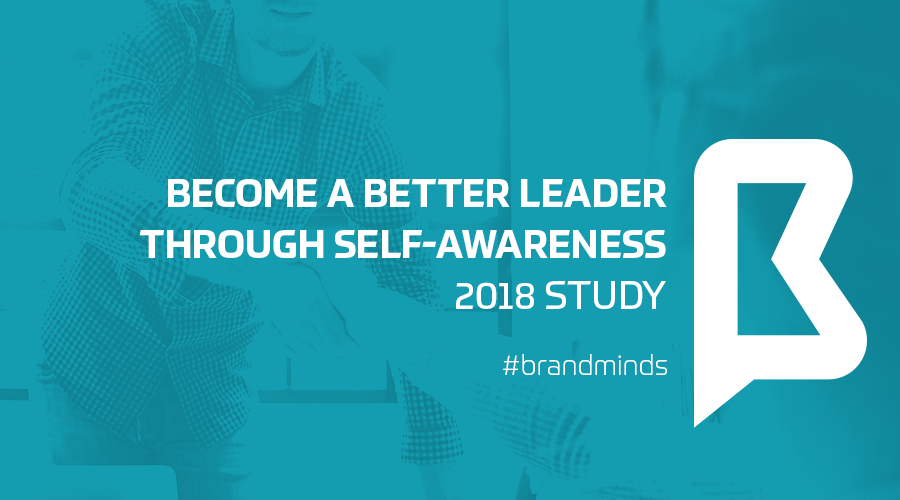What is self-awareness?
Self-awareness is understanding your own self. It means having a really good understanding of your emotions, as well as your strengths, limitations, attitudes, values and motives.
What does self-awareness have to do with leadership?
Part of being self-aware is knowing what emotions or feelings drive your behaviours. The moment you realise what triggers your behaviours you begin to understand about others’ actions and behaviours.
A 2013 analysis performed by Korn / Ferry Institute found that self-awareness appears to correlate with overall company financial performance. The companies with the greater percentage of self-aware employees consistently outperformed those with a lower percentage.
You are not working with machines, you are working with people.
As a leader you need to be aware of the emotions driving your team members. Surprisingly (or not!) being blind to the human factor was one of the reasons which contributed to Nokia’s demise from being the world’s best mobile phone company (read Why did Nokia fail?).
Building healthy relationships with employees is the leader’s most important goal. In our previous article we talked about what you need to do to achieve this goal.
Self-awareness in leadership – 4-year research
Dr. Tasha Eurich is an organizational psychologist and executive coach, with a 15-year professional experience witnessing the power of self-awareness in leadership.
For the past four years, together with her team of researchers, Dr. Eurich has been conducting a large-scale scientific study of self-awareness. The study consisted of 10 separate investigations with nearly 5,000 participants. The study’s objective was to examine what self-awareness really was, why leaders needed it, and how could leaders increase it. She will be publishing her results soon. Until then, she turned to Harvard Business Review to talk about the most important findings of her research.
Here are the 3 most important conclusions of the self-awareness study as detailed by Dr. Eurich:
- There Are Two Types of Self-Awareness
- Experience and Power Hinder Self-Awareness
- Introspection Doesn’t Always Improve Self-Awareness
1. There are two types of self-awareness: Internal self-awareness – External self-awareness
Self-awareness refers to the following subjects of interest:
- Values;
- Passions;
- Aspirations;
- Fit with your environment;
- Thoughts;
- Feelings;
- Behaviors;
- Strengths;
- Weaknesses;
- Impact on others.
Dr. Eurich has discovered two categories of self-awareness: internal and external.
The internal self-awareness is about how clearly we see the subjects listed above.
We’ve found that internal self-awareness is associated with higher job and relationship satisfaction, personal and social control, and happiness; it is negatively related to anxiety, stress, and depression.
Dr. Tasha Eurich
The external self-awareness is about how others view us in relation to them.
For leaders who see themselves as their employees do, their employees tend to have a better relationship with them, feel more satisfied with them, and see them as more effective in general.
Dr. Tasha Eurich
The researchers assumed that a leader who is high on internal self-awareness would be high on external self-awareness as well. The results proved them wrong: there is virtually no relationship between them.
Dr. Eurich and her team identified four leadership archetypes, each with a different set of opportunities to improve:
- The Introspectors;
- The Seekers;
- The Aware;
- The Pleasers.

Here is what Dr. Eurich recommends:
- Don’t fall into the trap of valuing internal self-awareness over external self-awareness or the other way around;
- You need to actively work on both of them: seeing yourself clearly and getting feedback to understand how others see you.
Are you curious to discover how self-aware you are?
Dr. Eurich developed a 5-minute quiz to help you learn more about how you. Follow the instructions here.
2. Experience and Power Hinder Self-Awareness
Dr. Eurich found a surprising discrepancy between believing to be self-aware and actually being self-aware.
Even though most people believe they are self-aware, only 10-15% of the people we studied actually fit the criteria.
How do researchers explain this finding?
The more power a leader holds, the more likely they are to overestimate their skills and abilities.
This happens because senior leaders have fewer people above them who can provide candid feedback. And also because the more power a leader wields, the less comfortable people will be to give them constructive feedback, for fear it will hurt their careers. These leaders have less willingness to listen to feedback – they think they know more than their employees.
How to prevent this from happening to you?
Dr. Eurich found that people who improved their external self-awareness did so by seeking out feedback from loving critics — that is, people who have their best interests in mind and are willing to tell them the truth.
3. Introspection Doesn’t Always Improve Self-Awareness
The problem with introspection – you’re not doing it correctly!
Introspection is the process of examining the causes of our own thoughts, feelings, and behaviors. One can assume introspection leads to self-awareness. It is a correct assumption only if the introspection is done correctly. But most people are doing it wrong.
Seeking the reasons behind a particular reaction or behaviour must be an activity conducted with objectivity. Unfortunately the combination of previous life events and a low self-esteem or self-worth may drive us to the wrong conclusions.
Instead of allowing a negative inner critic from answering the introspecting questions, Dr. Eurich recommends replacing “Why” with “What”. Her research found that highly self-aware people asked themselves “why” less than 150 times, but asked themselves “what” more than 1000 times.
So instead of asking Why did Jane (your employee) gave me a negative feedback?, you should be asking yourself What are the steps I need to take in the future to do a better job?
“What” questions help us stay objective, future-focused, and empowered to act on our new insights.
Conclusions
To become a better leader through self-awareness you need to do the following:
- Focus on building both internal and external self-awareness;
- Seek honest feedback from loving critics;
- Ask what instead of why.


















